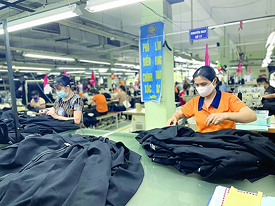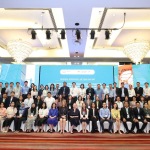Total number of posts 463.
 The export of goods was relatively favorable in the first months of the year with many orders in such large industries as textiles, footwear, etc. However, the risk of supply chain disruptions and interruptions in importing raw materials from China is posing many challenges.
The export of goods was relatively favorable in the first months of the year with many orders in such large industries as textiles, footwear, etc. However, the risk of supply chain disruptions and interruptions in importing raw materials from China is posing many challenges.
Reduce capacity, order debt
In spite of being known as the "manufacturing factory" of the world, due to unpredictable development of the Covid 19 in China and this country's persistence of a "Zero Covid" policy, the import raw materials and accessories of many Vietnamese products are much hindered.
Dap Cau Garment Corporation specializes in garment processing for major markets and imports up to 80% of raw materials from China. Up to now, this enterprise has received orders until September 2022, but it is worth noting that the enterprise has had to postpone the delivery of many orders due to the lack of raw materials.
Mr. Nguyen Duc Thang, CEO of Dap Cau Garment Corporation, said that over the past time, China's "Zero Covid" policy has obstructed many raw materials from ports in Shanghai, bring them stand still . When goods arrive slowly, businesses are forced to tear them apart and distribute orders to production teams to ensure jobs for workers. Normally, enterprises only spend 1 month with 1-2 production groups on 1 product code, but due to lack of raw materials, 1 code has to be torn apart, converted into 4-5 groups, which reduces labor productivity.
The leader of this business added: "For orders that do not have enough materials, we have to renegotiate the delivery time. However, the delivery time cannot be too slow because that makes businesses face many payment risks."
Similar to textiles, footwear is also under a lot of pressure on the supply of raw materials when this industry imports up to 70% of raw materials from China.
Phan Thi Thanh Xuan, Vice President and General Secretary of the Vietnam Leather, Footwear and Handbag Association, said that China's large-scale blockade caused supply disruptions. Furthermore, transportation and logistics costs are very high, so it is difficult for businesses to promptly respond to orders.
Mr. Nguyen Tien Chuong, Chairman of Dong Nai Import-Export Association, said that many materials and goods imported from China by Dong Nai enterprises are also in a state of disruption. The risk of interruption, reduced capacity and delay in orders puts great pressure on export enterprises.
As stated by the Department of Industry (Ministry of Industry and Trade), the dependence on raw materials and accessories from the Chinese market not only negatively affect production development and economic growth in the short term, but also hinders the industry in particular and Vietnam's economy in general in the long run.
Efforts to diversify supply
In the current context, the Ministry of Industry and Trade is urgently asking associations and businesses to carefully evaluate and review the impacts of China's application of blockade measures because of Covid-19. At the same time, because China's policy is "Zero Covid", domestic enterprises need to actively adapt to an appropriate strategy.
“The most important task of enterprises at this time is to restructure production soon, find alternative sources of supply to make amend for the shortage of the current raw materials and outdated equipment. Enterprises also need to promote linkages, support and make uses of domestic products in production and business activities to reduce dependence on external resources," a representative of the Ministry of Industry and Trade said.
In fact, to solve the immediate difficulties, besides negotiating with partners to share risks and extend delivery time, many businesses have also considered the option of finding new sources of supply outside of China. However, Mr. Nguyen Duc Thang emphasized: "This is not an overnight issue because China is the world's factory, supplying many raw materials and accessories at reasonable prices. In addition, most of the raw materials that Garment Dap Cau import are pre-assigned by partners."
Mr. Thang suggested that state management agencies need support in providing market information, enabling businesses to obtain new orders and expand sources to buy raw materials.
According to Mr. Vu Duc Giang, Chairman of the Vietnam Textile and Apparel Association, the Ministry of Industry and Trade needs to effectively promote the role of foreign trade counselors in order to strengthen the search for markets to supply raw materials along with supporting them to access to a reliable source with good prices. This not only increases internal competitiveness for enterprises but also minimizes the risks of dependence on a supply market
Affirming the role of active support export industries and enterprises in connecting supply and demand of raw materials, the representative of the Ministry of Industry and Trade said: “The Ministry of Industry and Trade has directed Trade Offices to actively seek, supply and regularly update the list of distributors, manufacturers and exporters of raw materials for the textile, footwear, computer, and other raw materials for the production of chemicals, furniture, iron and steel industries, while at the same time researching and promoting the import of essential materials for labor-intensive manufacturing industries such as textiles, footwear and electronics.”
The representative of the Department of Industry emphasized that in the long term, there must be solutions to develop supporting industries and a number of important basic material industries, and minimizing dependence on raw materials, components and input accessories. In particular, it is necessary to focus on supporting capacity building of enterprises through supporting solutions in credit, human resources, innovation and market development as well as tax and land incentives.
“The Ministry of Industry and Trade is trying to perfect the system of policies related to supporting industries for businesses to directly and easily access them, and at the same time coordinate with international organizations and multinational corporations to support enterprises to improve their capacity, enhance their management, and most importantly, facilitate enterprises to participate in the supply chain," said Pham Tuan Anh, Deputy Director of the Department of Industry.
Source: Customs News














